
Discoguy: So, Henri, How come you started with music?
"Well, I started back a long time ago, I was living in Morocco and representing major companies, including French
companies like Barclay or American companies like Atlantic and so and so... That's how I got hooked up on
music, with R'n'B, Funk, Jazz and Classical."
Work with music, was that something you had always wanted to do?
"Yes, definitely so. When I was living in Morocco as a young kid, Americans came during the end of World War 2. And they
established an American base and they had their own radio, you know. So, I was very young and listening to the American
radio. That's how I got exposed to American music. At that time American music was Glenn Miller, and all
the music of the fifties."
When did you really start WORKING with music?
"Well, I finished my studies in Paris and when I was in Paris I met a guy called Eddie Barclay, he
was running a very large company, Barclay Records, that he ultimately sold to Polygram. We became
friends and he asked me to represent him in Morocco.
So I flew back to Morocco and I opened my first record company as an independent, representing Barclay and after that
Atlantic and a lot of people and artists. And in the end of sixties, the economical and political situation in Morocco was
really very unstable. So I flew back to Paris and I started to work with Polydor Records. I did almost everything there and
in five years I ended up being one of the youngest presidents of a major company. It was about the end of 1970. And in the
year 1970 I decided to do something that was very new for that time, I decided to quit and leave my Presidency at this major
company and become an independent. It was quite new 30 years ago, so I founded my first French independent record company.
It was called Carabine Music. I dealt mostly in French repertoire and back catalogue and Jazz and Classical.
The BIG idea came in the year '73. I flew to America to go there and meet the music I always loved. And while I was in
America I went to all the clubs and the Discotheques and I also flew to Philadelphia to meet some friends of mine. That's
were I started to listen to what became the "Philly Sound". I became friends with the owner of the famous recording studio
called Sigma Sound, where Gamble & Huff and all of the Philly people were recording.
And that's how I started to get acquainted with musicians and arrangers.
 And I opened my first record company in America back in '73, called Can't Stop Productions. And I
promised myself that I would be back to America and Philadelphia when I would have THE idea.
And I opened my first record company in America back in '73, called Can't Stop Productions. And I
promised myself that I would be back to America and Philadelphia when I would have THE idea.
And THE idea came in the beginning of 1975, when I met a young composer called Jacques Morali. He came
to my office to offer me his services. He was very enthusiastic and he always dreamt of going to America. So I said to him
'Jacques, when you've got an idea, you come back to see me and I'll take you to America.' And he said 'Oh, I don't believe
you.' I said 'Yes. I will do it.'. The Beginning of '75 Jacques came back and told me 'Listen, why don't we take this all
Brazilian song called "Brazil", it was a song from a musical sung by Carmen Miranda. Why don't we try to
do a recording for the Discotheques?' At that time, you have to remember that, the word 'Disco' did not really exist."
Yes. I know, Disco wasn't "invented" yet.
"It was music for the clubs. So, Yes! I jumped immediately on the idea. I took Jacques Morali with me and we
flew directly to Philadelphia and to the studio, Sigma Sound. There I called all my friends and told them about
the idea and in two weeks I did a casting. I casted three beautiful black girls called the Ritchie Family
and we went to the studio to record "Brazil", by the Ritchie Family."
The original tree ladies of the Ritchie Family were Cheryl Jacks, Cassandra Wooten
and Gwendolyn Oliver. They were later replaced by Vera Brown, Jacqui
Smith-Lee and Theodosia "Dodie" Draher.
Their first album, the 1975 smash Brazil was released on 20th Century Records and the following
four were all released on the T.K.Disco sub label -
Marlin. These albums were called - Arabian Nights [1976] which included the hit
"the Best Disco in Town", Life Is Music [1976], African Queens [1977] and
American Generation [1978]. For the groups 1979 album Bad Reputation they where
found on the legendary Casablanca label.
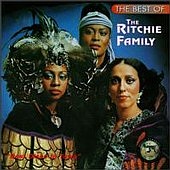 Henri continues: Why the Ritchie Family? Because the arranger we took from Philadelphia was an Italian guy called
Ritch Rome and his nickname was Ritchie, so when we formed that group of three black girls we said 'OK,
let's call them Ritchie Family'. And for that historical session, we used the best musicians. The drummer was
Earl Young. Earl Young 'invented' the Disco drums. He was one of the first ones to use a
big kick on the foot based drum. You know this 'Boom-Boom'. And more than that the snare doing 'tchicka-tchicka'. You know
that special things that made Disco happened. So, we used him, we used the best strings and horns of the Philly Sound and we
were lucky enough to hit 'Bingo' with "Brazil".
Billboard and Record World, the magazines of that time, invented Charts called for Disco for us."
Henri continues: Why the Ritchie Family? Because the arranger we took from Philadelphia was an Italian guy called
Ritch Rome and his nickname was Ritchie, so when we formed that group of three black girls we said 'OK,
let's call them Ritchie Family'. And for that historical session, we used the best musicians. The drummer was
Earl Young. Earl Young 'invented' the Disco drums. He was one of the first ones to use a
big kick on the foot based drum. You know this 'Boom-Boom'. And more than that the snare doing 'tchicka-tchicka'. You know
that special things that made Disco happened. So, we used him, we used the best strings and horns of the Philly Sound and we
were lucky enough to hit 'Bingo' with "Brazil".
Billboard and Record World, the magazines of that time, invented Charts called for Disco for us."
Yes, and Tom Moulton...
"Tom Moulton was doing the critics of the Billboard Disco column. We obviously entered the charts and we charted three
songs from the album and the song "Brazil" by Ritchie Family was the first one historically to hit Top 5 Pop in the
Billboard charts for a Disco record by three black girls. So the adventure started... in '75 in Philadelphia. The record
was released around the world and it was an enormous success and surprise. 'Disco' was really born!"
When the Ritchie Family hit it big time, was that when you decided to move to New York?
"Yes, so we moved to New York. I opened my office. I hired people and I started to do my business from New York,
licensing my Ritchie Family records all around the world. After "Brazil" we came back with another idea... and Jacques and
I, we became writers, we wrote "Best Disco in Town". That became that splendid standard. You remember "Best Disco in Town" -
number one in Disco sound. Here we were in America and in New York, becoming record producers and writers. We were going
every night to all the clubs including the gay clubs. Jacques was gay, I was not. But we were very good friends and had a
lot of gay friends. I was talking to the gay community about what they liked and their lifestyle, what they wanted to listen
to musically and what were their dream, their fantasy.
One day we were walking in the streets of New York. I remember clearly it was down in the Village, and we saw an Indian
walking down the street and we heard the bells he was carrying on his feet's. We followed him into a bar. He was a bartender,
he was serving and also dancing on the bar. And while we were watching him dancing and snipping our beer, we saw a cowboy
watching him dance. And Jacques and I suddenly had the same idea. We said 'My God, look at those characters.' So we started
to fantasize on what were the characters of America. The mix, you know, of the American man. But also a song of the
turbulent gender that trigger the attention of the gay community. And this is how we came with that idea of putting together
a group of five males and which each one is an own character. And we named it the Village People, because we
discovered these characters in the Village. So we said 'OK, they are the guys of the Village.' So, this is how we
started."
Yes, and that turned out to be a terrific idea.
"Yes! So, for the first album we did not had casted the group yet. We just had the lead vocal - Victor
Willis [the original Cop]. At that time he was playing as lead vocalist in a musical on Broadway..."
The Wiz.
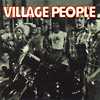 "The Wiz, Yes. So we asked him to do the session for us, OK. And we took professional backgrounds, but we brought
Felipe Rose, the Indian, our "mascot" to the recording. And to do the photo cover we put an add in a
newspaper there that we are looking for characters and we did a selection of characters and we took a picture and this is
the picture of the first album that you see that was taken by night in front of a club on the West side of the Hudson
river."
"The Wiz, Yes. So we asked him to do the session for us, OK. And we took professional backgrounds, but we brought
Felipe Rose, the Indian, our "mascot" to the recording. And to do the photo cover we put an add in a
newspaper there that we are looking for characters and we did a selection of characters and we took a picture and this is
the picture of the first album that you see that was taken by night in front of a club on the West side of the Hudson
river."
OK.
"This is the photo we have. The album became a success, an underground success, when we sold about 100'000 we said 'It's
about time to put together a real group', because as you know, we signed this album to Casablanca Records
- Neil Bogart."
 Why Casablanca Records?
Why Casablanca Records?
"Because he [Neil] was already famous with Kiss and Donna
Summer and he was really a music man. So he understood immediately where we wanted to go."
Where you somehow close connected to Casablanca? Because most of your acts were actually released on
Casablanca Records.
"Yes, but there is an amazing story. I am born in Casablanca."
Oh - OK.
"So I was always attracted about that idea of having someone in America establishing a record company called Casablanca.
Nile Bogart already had a reputation of being a talent scout and a music man - someone that will fast understand an idea.
Because it was an extraordinary idea, but at that time it was a provocative idea."
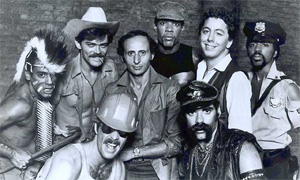 Henri continues: "We did that first album and to write the songs of the first album we thought of all the places in
America where they had a gay life. So, Hollywood, San Francisco, Key West and Fire Island. Fire Island was a small island
on Long Island that was famous for the Tea dance party on the Sunday afternoon 5 PM. The best DJ's were playing on Fire
Island. This is why we wrote the songs around these towns or cities or islands. I called Neil Bogart and I told
him that I had an idea. Jacques and I flew to Los Angeles and the day before we had a meeting with him, we went to a club
and we convinced the DJ to play our acetate. He was kind enough to do it, because we already had a reputation with the
Ritchie Family. I remember he played San Francisco. It was a big Studio, 4-5000 people and I was scared to
death. Because he played the 'San Francisco' at the peak hour around 2 AM. The first 30 seconds the floor got
empty! I said to myself 'My God, it's a failure!' And when the chorus came 'San Francisco' a miracle - 5000
people were screaming back on the dancefloor and everyone kissing us, congratulating us. I said 'Jacques, we got an idea
there, there is something!'
Henri continues: "We did that first album and to write the songs of the first album we thought of all the places in
America where they had a gay life. So, Hollywood, San Francisco, Key West and Fire Island. Fire Island was a small island
on Long Island that was famous for the Tea dance party on the Sunday afternoon 5 PM. The best DJ's were playing on Fire
Island. This is why we wrote the songs around these towns or cities or islands. I called Neil Bogart and I told
him that I had an idea. Jacques and I flew to Los Angeles and the day before we had a meeting with him, we went to a club
and we convinced the DJ to play our acetate. He was kind enough to do it, because we already had a reputation with the
Ritchie Family. I remember he played San Francisco. It was a big Studio, 4-5000 people and I was scared to
death. Because he played the 'San Francisco' at the peak hour around 2 AM. The first 30 seconds the floor got
empty! I said to myself 'My God, it's a failure!' And when the chorus came 'San Francisco' a miracle - 5000
people were screaming back on the dancefloor and everyone kissing us, congratulating us. I said 'Jacques, we got an idea
there, there is something!'
So the day after at the meeting with Casablanca we pretty much stronger in our believe. You know, we tested it in a club.
But I have to say that Casablanca Records and Neil Bogart immediately recognized a potential winner
and we signed a deal in an hour. That's how we started, so we went back to New York and we casted the real group. That's
where we hired all the four other members - Glenn Hughes [the Biker], Alexander
Briley [G.I.], David Hodo [Construction Worker], Randy Jones
[Cowboy]. We put the group together and we started to tour the clubs. But No TV or no other things, because it was so
underground."
Yes, In those days...
"Yes. But one day WBLS, a New York radio station playing Disco at that time, their main DJ called Frankie
Crocker, with that fantastic voice, started to play Village People and suddenly here we are.
Entering the charts, the record company pushing the record, people asking us to go on TV, to start touring and we were
launched. That's when we really started...
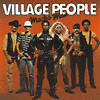 We went back to the studio and we started to write the song, and the second album, called "Macho man". "Macho Man" took
"San Francisco" where it was to a multi platinum status in America. Because we write in the ego of all the people that were
going to the health club building muscles. Pumping iron. So, 'I wanna be a Macho man', OK. To go out and do what I want,
with anyone I want. So it was always double engender in the lyrics. That very good arrangement and "Macho Man" became a hit.
Not a Pop charts hit, I think it ended up around top 20. But we started to go mainstream, a lot of radio were starting to
play us.
We went back to the studio and we started to write the song, and the second album, called "Macho man". "Macho Man" took
"San Francisco" where it was to a multi platinum status in America. Because we write in the ego of all the people that were
going to the health club building muscles. Pumping iron. So, 'I wanna be a Macho man', OK. To go out and do what I want,
with anyone I want. So it was always double engender in the lyrics. That very good arrangement and "Macho Man" became a hit.
Not a Pop charts hit, I think it ended up around top 20. But we started to go mainstream, a lot of radio were starting to
play us.
And in '78 - Bingo! again in the streets. Our music always came to the street to go back to the street. We were walking down
the street and we saw that sign YMCA and I asked Jacques 'Hey, what is that.' He said 'Henri, let me tell you
something. This is a place where a lot of people goes when they are in town. And they get good friends and they go out.'
And I said 'Why don't we write a song about it?' So we wrote the song "Y.M.C.A" and..."
And that became one of the best Disco songs ever!
"Yes, and this one became almost number one... We were number one in all the clubs dance charts of course, all around
the world. But in America it did not went to number one in the Pop chart in Billboard. It went only number two, because that
same month Rod Stewart with "Da ya think I'm sexy" went number one. So it was impossible to jump. BUT,
we sold 5-6 million albums and around the world, that's an enormous amount of albums and we started to performing all the
big TV shows and we became trendy."
 The Top Hit "Y.M.C.A" was on the Village People's third album, called Cruisin'. Even though the album never
made it's way all up to number one it was a good album and some of the song titles refers to some of the characters of the
group; "I'm a Cruiser" - the Biker and "Hot Cop" - obviously the Cop. Beside "Y.M.C.A" and these two tracks,
the album also included the songs "The Women", "My Roommate" and "Ups and Downs".
The Top Hit "Y.M.C.A" was on the Village People's third album, called Cruisin'. Even though the album never
made it's way all up to number one it was a good album and some of the song titles refers to some of the characters of the
group; "I'm a Cruiser" - the Biker and "Hot Cop" - obviously the Cop. Beside "Y.M.C.A" and these two tracks,
the album also included the songs "The Women", "My Roommate" and "Ups and Downs".
I've heard that when you wrote "In the Navy" - the Navy wanted you to write it because all the
success of "Y.M.C.A.". The YMCA got so many new members because of your song and the Navy wanted something similar
with "In the Navy"... Is that correct???
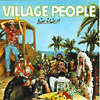 "Well, this is partially correct. Here we are with the third album selling platinum. The record company asking us to go
back on the road, we leave with 52 people, musicians and everything and we started to write the songs of the fourth album.
Our main song in that fourth album strangely enough was not "In the Navy", it was "Go West". We believed "Go West" would be
a monstrous hit. We were right, because many years later Pet Shop Boys had a number one with it. We
tried "Go West" as a single, but it did not react well so we went for "In the Navy". So, "In the Navy" started to get
air-play, that's when, and only at that time, when the Navy contacted us. Because - Yes - at that time they had a problem
with their recruitment.
"Well, this is partially correct. Here we are with the third album selling platinum. The record company asking us to go
back on the road, we leave with 52 people, musicians and everything and we started to write the songs of the fourth album.
Our main song in that fourth album strangely enough was not "In the Navy", it was "Go West". We believed "Go West" would be
a monstrous hit. We were right, because many years later Pet Shop Boys had a number one with it. We
tried "Go West" as a single, but it did not react well so we went for "In the Navy". So, "In the Navy" started to get
air-play, that's when, and only at that time, when the Navy contacted us. Because - Yes - at that time they had a problem
with their recruitment.
Their recruitment was down and they wanted to do an advertise on TV and radio and they had the idea to use our song to do
the musical add. So, when they ask us if we were OK to give the song to the Navy to do that ad, I said 'Yes, why not!' They
said 'How much do you want?' I said 'No, no money. But in return I want the Navy to help me to shoot the video-clip for "In
the Navy"' That's how, three weeks later, we ended up in San Diego Naval base. One of the biggest Naval bases in the world.
And the Navy giving us a war ship, five airplanes - Phantoms, and 2 or 300 Navy men. That's where we shot that clip that you
see.
And here we were, but the problem is - two weeks after the clip was showed and the advertisement of the Navy was on
the air, a big newspaper of New York called the New York Post wrote an article in the front page - 'The Navy is using Tax
Dollar money to fund a group with a video'. You know, something very bad, and you know how America is - very hypocrite about
these things. So, ultimately the Navy called off their advertisement and cancelled their campaign, but that gave us so much
promotion with whatever the papers wrote that "In the Navy" became a monstrous hit too. That's the story of "In the
Navy"."
"In the Navy" was released in 1979 and you guys were really busier than ever.
"In fact, in '79 many big things happened. First we really toured with the guys live, with a big band. We were sold out
at Madison Square Garden in New York for two nights. Sold out at the Felt Forum in Los Angeles. We did 52 cities and that
same year we lived also in Beverly Hills, Los Angeles, because we did that movie called Can't stop the music. That,
unfortunately was released too late, Disco was dying so the movie bumped - in America, but in Australia it was number one.
So we were really, really, really busy."
As Henri mentions above, Pet Shop Boys were the ones who took "Go West" to number one. But besides that song the Pet
Shop Boys also have recorded a song called "New York City Boy", which, according to the guys themselves is a
tribute to the Village People. This song is really breathing classic Village People and Morali/Belolo DISCO. The "Boys" were
working with famous remixer David Morales for this tune and together they made a GREAT - DISCO - song!
If we go to the different acts that you and Jacques were working with. Have you got any favorite of
these? Like the Ritchie Family, Village People, Patrick Juvet,
Dennis Parker and all the others?
"Not really. You know, when you are a producer - all your acts are your babies. Specially when you not only produce but
also wrote or co-wrote the songs. And it's like when you have a family with 10 kids, you can not say that you like this kid
more than this one. You love them all dearly. So in real and deep honesty I can not say that I really have more feelings
for this one than this one. Yes, perhaps I will have a special feeling for my three first Ritchie Family girls.
The ones that I discovered down in Philadelphia's Sigma Sound. Because it was the beginning of the beginning, but they are
all dear to my heart."
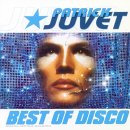 Which do you think is the best work you and Jacques did together?
Which do you think is the best work you and Jacques did together?
"Definitely "Go West", "Y.M.C.A" and "In the Navy". Definitely Patrick Juvet's "I love America", it's a
piece of art and I'm sure that people, when they read the lyrics, will understand what we wanted to express. And definitely
Break Machine with "Street dance", because here we helped HipHop and Break dancing to spread around the
world. And with a special attention to some of the songs we have written for the Village People that were never
successful, like the song "5 o'clock in the morning". That is a splendid song or a song for Dennis Parker
called "New York by night"."
Yes, I love that song.
"Especially that phrase that says 'At Studio 54, waiting at the door, can't get in...'"
'...Just can't win.'
"When I saw the movie I said... Well, we worked out Studio 54
every night, you know, we were really in the middle of that Disco revolution of that time. It was something crazy, short but,
My God, so much life, so much happiness. So much enjoyment. We were in the middle of no war, the economy was not too bad,
people wanted to go out after Vietnam. They wanted to have a good time. Sex was starting to get liberated, the gays were
starting to do some outing. Everything was exploding, it was a new generation and of course they did not wanted to be the
old generation that was Pop or Rock - they wanted to be Disco. That's what it was."
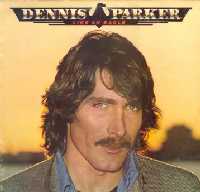 Dennis Parker mentioned above was born October 28, 1955, but he was also known as Wade Nichols - the porn star
actor, who Jacques and Henri turned into a Disco star.
Dennis Parker mentioned above was born October 28, 1955, but he was also known as Wade Nichols - the porn star
actor, who Jacques and Henri turned into a Disco star.
His first adult role was in the 1975 film 'Exploring Young Girls'. He followed with films such as 'Summer of Laura', 'My
Sex-Rated Wife', 'Visions', 'Take Off' and 'Raw Footage'. He also appeared in the 1975 adult Gay film 'Boynapped!'.
In 1979, as Dennis Parker, he had two huge hits with the Morali/Belolo songs; "Like an Eagle" and "New York by
Night", both tracks featured in the same Casablanca 12" single and in the Like An Eagle album.
Also under the name Dennis Parker, he was known for playing Police Chief Derek A. Mallory on the soap opera 'The Edge of
Night' from 1979 to 1984. During the final weeks of the show, he was too ill to tape any episodes and had the show not been
cancelled, he would have been replaced.
Despite his success in 'The Edge of Night' he returned to adult films in 1979 starring in 'Punk Rock' and 'Captain Lust And
The Pirate Women'. In 1980 he did 'Love You' and in 1981 he starred in his final adult film, 'Blonde Ambition'.
Sadly he was diagnosed with AIDS in 1984 and committed suicide in January 28, 1985.
So, did you and Jacques have different roles in the creative process?
"Oh Yes. Definitely so. Jacques was definitely the melodist. He was a magician that came with all the hooks in the
melodies. I was the one that came almost all the ideas for the lyrics. But as my English was not too good at that time, I
started to write the song and the main ideas in French and/or in bad English and I got the help of Victor Willis for the
men songs, or a team of good writers like Phil Hurt and Boris Whitehead to help me
in adapting my ideas to good American lyrics. So that was our roles.
Jacques was in the studio all the time and I was running the business and I was sharing studio burden with him almost 70%
of the time. So, he was working by night and I was working day and night. Hahaha! [both laughing] 'Cause I had to
take care of the business too."
When did you and Jacques decide to end your successful partnership – and why?
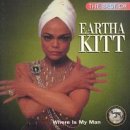 "Well, two thing... First, in the beginning of the year 1980, Disco died. And we had a backlash in America. The other
countries maybe one or two years later. Why that, because it was too many bad Disco productions. Specially the ones coming
from Italy and overseas. So, we really were not happy with this and thanks God, and between '82 and '84 we invested our time
in doing Eartha Kitt with "Where is my man" and "I love men" and Break Machine.
"Well, two thing... First, in the beginning of the year 1980, Disco died. And we had a backlash in America. The other
countries maybe one or two years later. Why that, because it was too many bad Disco productions. Specially the ones coming
from Italy and overseas. So, we really were not happy with this and thanks God, and between '82 and '84 we invested our time
in doing Eartha Kitt with "Where is my man" and "I love men" and Break Machine.
But in '84 and '85, this horrible thing called AIDS began to show its face and Jacques was scared about it. So he decided
to move to Paris, France. So, I moved with him back and we stopped producing in America. And unfortunately Jacques became
ill and he became bitter. He did not understand why he was perhaps going to die. He was young and I agreed with him. And he
was bitter against all the world. His artists, his partner, my wife - everyone. But the poor guy, he was going to die
ultimately. So we separated as good friends and we did not work together.
 I, of course, run my French record company called Scorpio and I started to license all the dance records coming out
from England and Italy. "High Energy" - Evelyn Thomas, you know, Miquel Brown - you
name it, OK. So I came back to my business of licensing and my record company and not producing. And Jacques produced one or
two French artists with some success and ultimately he died in the year '91. In '90 I decided to really put all my efforts
in my business and between '90 and 2000, I took Scorpio to the number one record company of France. That's great and we
became involved with all the dance records that became famous since ten years from Eiffel 65, to
Phats'n'Small, Spiller now with "Groovejet", you name it. So here I am running my
business. Village People are of course still living, they are all touring. They're touring around 80-120 days
a year. Victor Wills left the group in '79. He was replaced with by Ray Simpson who's still the
lead singer and Randy Jones left the group, he was replaced by Jeff Olson. And that's it. The rest,
they are there. Except perhaps for Glenn Huges, who retired perhaps 8 months ago and he is taking care of the
company of the Village People - called 'Sixovus Ltd.'."
I, of course, run my French record company called Scorpio and I started to license all the dance records coming out
from England and Italy. "High Energy" - Evelyn Thomas, you know, Miquel Brown - you
name it, OK. So I came back to my business of licensing and my record company and not producing. And Jacques produced one or
two French artists with some success and ultimately he died in the year '91. In '90 I decided to really put all my efforts
in my business and between '90 and 2000, I took Scorpio to the number one record company of France. That's great and we
became involved with all the dance records that became famous since ten years from Eiffel 65, to
Phats'n'Small, Spiller now with "Groovejet", you name it. So here I am running my
business. Village People are of course still living, they are all touring. They're touring around 80-120 days
a year. Victor Wills left the group in '79. He was replaced with by Ray Simpson who's still the
lead singer and Randy Jones left the group, he was replaced by Jeff Olson. And that's it. The rest,
they are there. Except perhaps for Glenn Huges, who retired perhaps 8 months ago and he is taking care of the
company of the Village People - called 'Sixovus Ltd.'."
To straighten any questions out with the different members of the Village People, here's Today's Village People:
Eric Anzalone (the Biker - Eric replaced Glenn Hughes), Alexander Briley
(the original G.I.), David Hodo (the original Construction Worker), Jeff Olson (the
Cowboy - Jeff replaced Randy Jones), Felipe Rose (the original Indian) and Ray
Simpson (the Cop - Ray replaced Victor Willis).
One fun fact about Victor Willis is that he actually was married to Phylicia Allen (later Rashad) for
two years in 1978-1980. Phylicia actually also recorded an album in 1978 entitled Josephine Superstar
which was produced by no other than Jacques and Henri, even the Ritchie Family girls and the Village
People were singing background vocals on the album. But most known is Phylicia for her role as Mrs. Claire Huxtable,
the mom in the classic TV sit-com - "The Cosby Show".
In mid March of 2001 we were reached by the message that Glenn Hughes - the original biker of Village People - had passed
away after a long times sickness. It's told that Glenn was buried in his classic biker clothes, according to his last
wishes.
|
 |
Download the FREE basic RealPlayer...

CLICK to hear some Henri/Jacques songs...
Street dance
Break Machine
New York by night
Dennis Parker
Like an Eagle
Dennis Parker
Where is my man
Eartha Kitt
I am what I am
Gloria Gaynor
I love America
Patrick Juvet
Lady night
Patrick Juvet
Give me a break
Ritchie Family
Can't stop the music
Village People
Go West
Village People
In the Navy
Village People
Macho Man
Village People
San Francisco
Village People
Y.M.C.A
Village People
CLICK to hear some related songs...
Ring my bell
Anita Ward
Love to love you baby
Donna Summer
I will survive
Gloria Gaynor
I was made for lovin' you
Kiss
Feel good
Phats & Small
Turn around
Phats & Small
Da Ya think I'm sexy
Rod Stewart
Groovjet
Spiller
Disco Inferno
Trammps

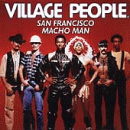
Click to buy from


San Francisco (You've Got Me)
In Hollywood (Everyone is a Star)
Fire Island
Village People
Macho Man
I Am What I Am
Key West
Just a Gigolo
I Ain't Got Nobody
Sodom and Gomorrah

Click to buy from


In the Navy
Go West
Citizens of the World
I Wanna Shake Your Hand
Get Away Holiday
Manhattan Woman
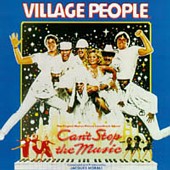
Click to buy from


Can't Stop The Music
Samantha
Give Me A Break
Liberation
Magic Night
The Sound Of The City
Milkshake
Y.M.C.A.
I Love You To Death
Sophistication
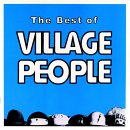
Click to buy from


Y.M.C.A
Macho Man
Can't stop the music
San Francisco (You've Got Me)
In Hollywood (Everybody's a star)
Ready fo the 80's (12" version)
Key West
In the Navy
Fire Island
Go West (12" version)
Village People
Hot Cop
In the Navy (12" version)
Y.M.C.A (12" version)

Click to buy from


Got A Feeling
Oƒ Sont Les Femmes
L'enfant Aux Cheveux Blancs
I Love America
Lady Night
Medley Gay Paris
French Pillow Talk
Swiss Kiss
Viva California
Paris By Night
I Love America (Part 1 & 2)
Where Is My Woman
Ca C'est Paris (Radio Edit)

Click to buy from


Brazil
Dance With Me
the Best Disco In Town
Arabian Nights (Medley)
Life Is Music
Lady Luck
African Queens (Medley)
Summer Dance
American Generation
Good In Love
Put Your Feet To The Beat
Gimme A Break
All Night All Right
It's A Man's World
Sophistication
I'll Do My Best (For You Baby)
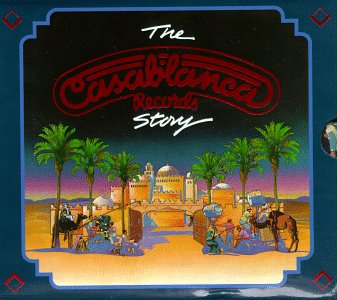
Click to buy from


Disc 1:
Love To Love You Baby - Donna Summer
Funkytown - Lipps, Inc.
Tear The Roof Off The Sucker - Parliament
Take Me Home - Cher
I Feel Love - Donna Summer
Romeo And Juliet - Alec R. Costandinos
Ain't Nothin' Gonna Keep Me From You - Teri Desario
In The Navy - Village People
My Baby's Baby - Liquid Gold
Find My Way - Cameo
I Found Love (Now That I Found You) - Love And Kisses
Disc 2:
Thank God It's Friday - Love And Kisses
Macarthur Park Suite - Donna Summer
Music, Harmony And Rhythm - Brooklyn Dreams
San Francisco (You've Got Me) - Village People
In Hollywood (Everybody Is A Star) - Village People
Let's Go All The Way (Down) - Brenda & The Tabulations
Let Them Dance - D.C. LaRue
Put Your Feet To The Beat - Ritchie Family
Pleasure Island - Paul Jabara
Like An Eagle - Dennis Parker
Disc 3:
Flashlight - Parliament
I Just Want To Be - Cameo
I Just Wanna Dance With You - Starpoint
Hot Stuff - Donna Summer
Bad Girls - Donna Summer
Chase - Giorgio Moroder
Walk The Night - Skatt Bros.
Don't Stop Get Off - The Sylvers
You Ought To Be Dancing - People's Choice
Medicine Song - Stephanie Mills
Dance, Freak And Boogie - Nitelife Unlimited
Macho Man - Village People
Pleasure Principle - Parlet
Disc 4:
When She Was My Girl - Four Tops
Just As Long As We're Together - Gloria Scott
YMCA - Village People
Star Wars Theme / Cantina Band - Meco
Maniac - Michael Sembello
Touch Me Baby / Love Is The Ultimate - Ultimate
Do That To Me One More Time - Captain & Tennille
Yes, I'm Ready - Teri Desario with K.C.
After Dark - Pattie Brooks
Flashdance (What A Feeling) - Irene Cara
Last Dance - Donna Summer
For more Henri & Jacques CD's...
Click here!
|
|

Have you got a copy of every record you've been involved in?
"Oh yes, I think so. We re-released the back catalogue of the Village People on CD's, because it was never
available on CD. We have released 'the Best of...'. We are going to release the Ritchie Family on CD's. Yes, I
have got pieces of everything I did. Because, of course, I have the masters and I'm still licensing for lots of compilations
and remixing of my stuff."
Do you know how many songs you've been involved in? And I mean songs, not records.
"Roughly I think I have in my catalogue as a writer - around 225."
And as a producer?
"As a producer... It should be near of 350-400 songs. It's a lot of time you know. And remember at that time there were
no home studios, no synthesizers, no drum machines. It was arrangement writing, big bands - my God."
Which is your favorite piece of work out of the ones you've been involved in? Have you got a favorite
song?
"Definitely "Y.M.C.A". That was really a big song. And I have to say also it became a big song because the arranger,
Horace Ott, created that arrangement that started with the horns. That famous 'Ta-ta-ta...' And the Village
People created the choreography with the 'Y', 'M', 'C' and 'A'. So, in life you discover that an invention is not
always one man or two men. It's a combination of people putting their love together. And I said love because you can not
create a song that out pass the years, because "Y.M.C.A" became a standard that will stay forever.
Just let me tell you something about this... The New York Times lately called me because they put in a capsule
that will be sent in the space, some items that will represent our century. And one of the items was a recording of the
Village People's "Y.M.C.A" - it's amazing!"
Yes, that's amazing!
"It's an amazing story. So, yes, definitely "Y.M.C.A". Because of, obviously, my work as a co-writer and producer was
rewarded by so many people enjoying it."
Lately "Y.M.C.A" has been used in a Philips commercial for their new CD Recorder. The commercial is filled with Village
People look-a-likes as well as people looking like Tina Turner, Amii Stewart,
Elvis Presley, James Brown and many many others.
 "Y.M.C.A" also held the number 7 spot when the music channel - VH1 - decided to list the
100 Greatest Dance Songs of the 20th Century. The show was presented by the singer
and dancer Paula Abdul, who used to teach Janet Jackson and other music stars how to dance in the
1980-90's. This great show was first broadcasted in October 2000.
"Y.M.C.A" also held the number 7 spot when the music channel - VH1 - decided to list the
100 Greatest Dance Songs of the 20th Century. The show was presented by the singer
and dancer Paula Abdul, who used to teach Janet Jackson and other music stars how to dance in the
1980-90's. This great show was first broadcasted in October 2000.
I really don't have to ask you this, but I assume you really did love Disco music during that era?!
"Ah. Definitely so! I never cheat. For the moment I'm doing a lot of distribution and co-production in House and things
like this. It's not because it's working, it's because I like it. I went into Trance because I liked Trance. But you know,
I'm a music man - never forget this - my roots are in Gospel, Jazz, Classical, Folk songs - everything. I'm a Disco man
because I was labeled like this, but I'm also a House man, a High Energy man... Music with feelings. Because I was a DJ
when I was young in Morocco. So still I have the DJ feelings. Whatever makes me move my feet on the floor, even if I am over
60 years old but I look 42 - I think, makes me have fun. This is why I'm signing big hits, because I enjoy it."
As you just told me, You're still working with dance music...
"Ah - Definitely."
Do you think it is any difference to work with Dance music now than to work with Disco back then? Except
for the equipment.
"Yes, one difference, but I think that difference will not exist. In the time of Disco to my point of view we had to have
melodies. Real melodies with a hook and a chorus and lyrics. Since 10 years in dance, very often it is sampled. We have a
lot of sampling. It was not so much melodic. It's coming back, you know, for example I'm representing Alice
DeeJay, I'm representing a lot of groups like that. And now we are going back to the melodies, now we're going
back to more Dance-Pop oriented music. But for me all those productions of Trance are the kids of Disco."
Yes, I think so too.
"Oh, yeah! They are the kids of Disco and in fact the fact that all the young DJ's last year used Disco samples to
produce new things was a recognition of the fact that Disco became a standard that will stay forever. When they will speak
about the history of the music in the 20th century, Disco will be one among the others; with Rock'n'Roll, Pop... It's here
and it will stay forever."
 Since my pages are mainly Disco orientated - have you got any favorite Disco songs except for your own
work?
Since my pages are mainly Disco orientated - have you got any favorite Disco songs except for your own
work?
"Oh Yes! Definitely! the Trammps' - "Disco Inferno". Donna Summer's - "Love to
love you baby". I can tell you 10-20 of them, but on the top of my mind I love the Trammps. "Disco Inferno", I mean is so
BIG. And of course K.C. & the Sunshine Band, because I knew the guys. "That's the way (I like it)" and
Kool & the Gang... They are some of my favorites."
What do you think of the whole Disco era when you look back on it now?
"Fun! Joy! Happiness!"
Haha! Yes, that's some good words to sum it up.
"Yes. But with perhaps a sad ending. But an ending that was perhaps the beginning of the re-birth."
Yes, probably.
"It's like life. You die and someone is born. But to my point of view Disco will never die."
Right. I don't think Disco will ever die. But have you still got any contact with any old Disco acts?
Except for the Village People I guess...
"Oh, yes. Very often when they come for concerts here I meet with them. For the moment I'm working with Kool & the
Gang. On a project album with Kool & the Gang, with Jamiroquai and with a lot of other artists.
And every time there is a Disco act passing trough France they call me, I go and see them. I saw Ester
Philips lately. You know, we stay in touch. Gloria Gaynor
of course is my friend. And, yeah, we stay in touch. We call each other from time to time."
Henri released Gloria's version of the La Cage aux Folles classic "I am what I am" in 1983, on his
In the Mix label in Europe.
Nice to hear you still have contact with many of them, because you don't hear very much about them these
days.
"Yes, yes. You're right, but they're there somewhere. They're working back... The other day I was watching TV and I saw
the girl who did "Ring my bell" - Anita Ward. She was on TV. She was
a little older but she was there back singing. She was happy and in glittering suits. They're hanging around!"
So, Henri - What's you best memory during your years in the music business?
"When I was on American TV interviewed in the height of my career on a prime time TV show in America called NBC 20/20 with
fully 20 million viewers. And when following that interview and I was going in the streets everyone was recognizing me and
coming to congratulate me and I was only a Disco man, you know. But a lot of people, I mean, we became very famous at that
time. We still are today, I mean, without any ego, because there are so many articles in all the papers in England and in
America about that time. In the White House they are dancing to "Y.M.C.A". This will never end. Never! And I can see it even
when I go to a Disco at two o'clock today or a Rave party. Sometimes when the DJ plays a Disco song everyone is jumping and
bumping and having fun. Even the young kids."
So, that was actually my last question. Is there anything else you can think of that you wanna tell me
about?
"Well, No. I think I told you everything from the bottom of my heart. Honestly! And I wanted to congratulate you to be a
'Discoguy', long live Disco and when you write something about this - send me an e-mail. I would be happy to read
it."
Of course. I will let you read this first.
"Yes, and I will transfer your mail to all my Disco friends and I'll have them to contact you - OK?!"
That's terrific! Thank you!
"OK, It was a pleasure speaking to you."
The same to you. I really enjoyed it. Thank you!
"Ok - Bye bye.
Bye bye.
Henri Belolo and Jacques Morali have for always put their names in the music history. They were among the ones that made
Disco music come out from the underground (gay) clubs to become one of the most popular music styles ever. With their happy
and danceable music they made us all feel like we wanted to be "In the Navy" or "Go West" to
"San Francisco" to become a "Macho Man".
There are not many people that have had such an impact on a whole new genre with their music. Even though Jacques is not with
us any longer, his music and his friend Henri - is!
And - their music will live on forever! Thanks guys...
Henri Belolo & Jacques Morali
On December 12, 2000 - I got the following mail from Henri regarding this piece.
Dear DiscoGuy.
I'm back from nyc and read your article : this is a superb piece and i would like to congratulate you. A lot of people have
been writing about us in the past, but your piece is one of the best.
Thanks.
Henri
|
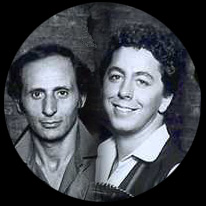













 And I opened my first record company in America back in '73, called
And I opened my first record company in America back in '73, called 

 Henri continues: "We did that first album and to write the songs of the first album we thought of all the places in
America where they had a gay life. So, Hollywood, San Francisco, Key West and Fire Island. Fire Island was a small island
on Long Island that was famous for the Tea dance party on the Sunday afternoon 5 PM. The best DJ's were playing on Fire
Island. This is why we wrote the songs around these towns or cities or islands. I called
Henri continues: "We did that first album and to write the songs of the first album we thought of all the places in
America where they had a gay life. So, Hollywood, San Francisco, Key West and Fire Island. Fire Island was a small island
on Long Island that was famous for the Tea dance party on the Sunday afternoon 5 PM. The best DJ's were playing on Fire
Island. This is why we wrote the songs around these towns or cities or islands. I called 
 The Top Hit "Y.M.C.A" was on the Village People's third album, called Cruisin'. Even though the album never
made it's way all up to number one it was a good album and some of the song titles refers to some of the characters of the
group; "I'm a Cruiser" - the Biker and "Hot Cop" - obviously the Cop. Beside "Y.M.C.A" and these two tracks,
the album also included the songs "The Women", "My Roommate" and "Ups and Downs".
The Top Hit "Y.M.C.A" was on the Village People's third album, called Cruisin'. Even though the album never
made it's way all up to number one it was a good album and some of the song titles refers to some of the characters of the
group; "I'm a Cruiser" - the Biker and "Hot Cop" - obviously the Cop. Beside "Y.M.C.A" and these two tracks,
the album also included the songs "The Women", "My Roommate" and "Ups and Downs".
 Dennis Parker mentioned above was born October 28, 1955, but he was also known as Wade Nichols - the porn star
actor, who Jacques and Henri turned into a Disco star.
Dennis Parker mentioned above was born October 28, 1955, but he was also known as Wade Nichols - the porn star
actor, who Jacques and Henri turned into a Disco star.


 "Y.M.C.A" also held the number 7 spot when the music channel - VH1 - decided to list the
"Y.M.C.A" also held the number 7 spot when the music channel - VH1 - decided to list the